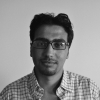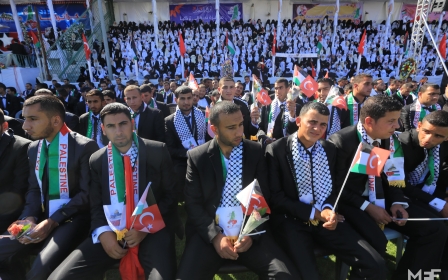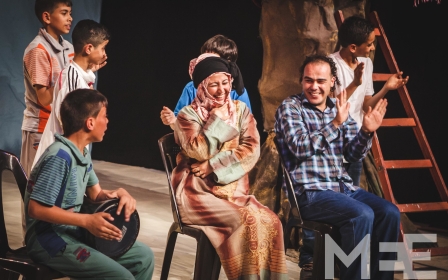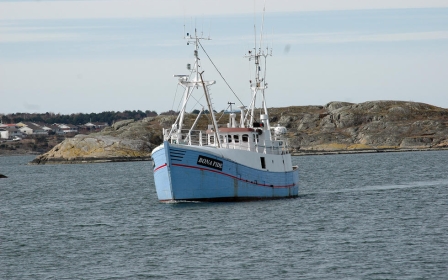Gaza: A diary of pain
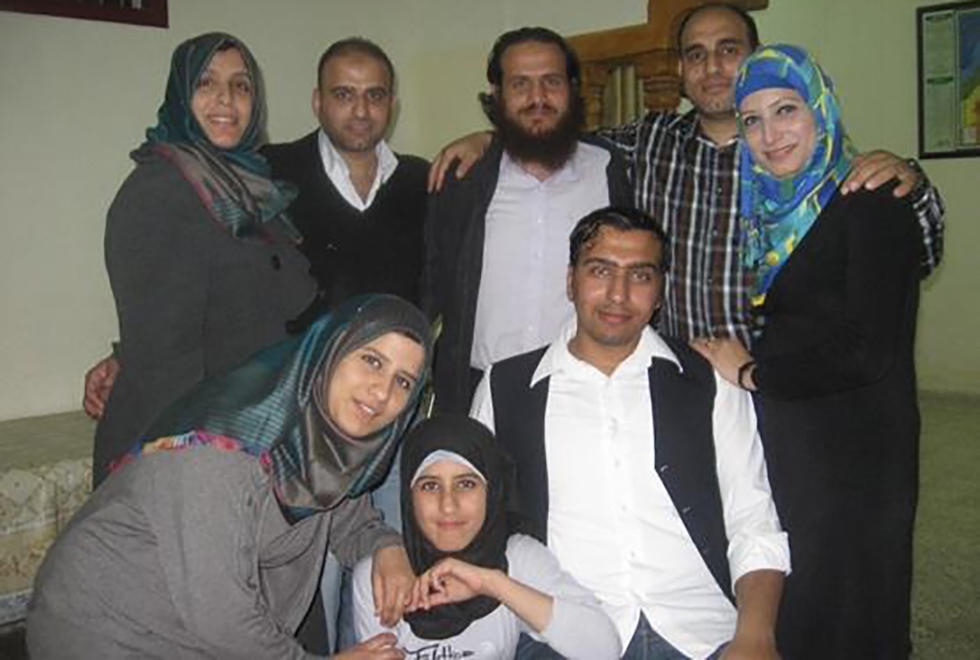
The more amazing life gets the more painful it becomes later. This simple truth has struck me harshly.
I come from a simple family with lovely parents, amazing brothers, and gorgeous sisters. I would never ever ask for anything more than the incredible life I have had.
It never occurred to me that life could be so stone-hearted that it would take everything from me in the blink of an eye. On 8 July 2014, our life in Gaza was turned upside down. Israel unleashed its rockets, tanks and so-called soldiers in a genocidal attack on armless and guiltless people only trying to put food on their table, despite the strangling siege imposed by Israel.
Things were horrible and people were falling so quickly that we lost count of the victims. Somehow, Israel masked these massacres, conveying a myth to the world that it was an act of self-defence.
24 July 2014
Despite the mass murders committed by the Israeli occuption forces, they used every tool at their disposal to subject the people of Gaza to utter humiliation. Yet we stood tall with our heads held high. My brothers Mohammed, Mahmoud and I had our Ramadan breakfast with our family after a long tiring day at work. We had so much fun, everyone was smiling and the kids were playing around us. Even our children knew how to pretend that everything was okay and that there weren't tanks and F16's outside, killing civilians. Such is our simple, yet very complex life in Gaza.
Close to midnight, everyone was preparing for sleep. I clearly remember my dad preparing for al-Fajr (dawn) prayer before he went to sleep. My brothers were returning to their homes with their wives and children, and my mom came to chat with me in my room. She told me about a poem she heard, loved, and asked me to listen to it, which I did. While reading the poem, a huge roaring sound rattled the area. We immediately ran to what we assumed was a safe place. I woke my dad and the rest of the family headed downstairs towards the ground floor, thinking it would be the safest.
But in Gaza, no place is safe.
The next thing I remember is waking up in al-Shifa hospital. Not understanding nor comprehending anything, I asked about mom, dad, and the rest of the family. Receiving an answer of them being ok, I accepted my severe injury and just let the doctors carry on with whatever they had to do. The relief in knowing that they were safe was all that mattered to me, not my injuries.
The doctors took X-rays, cleaned and stitched up my wounds and put me to bed for rest. I saw my third brother Mahmoud who was also in poor condition - we even laughed and said everything was fine despite what had happened. Half an hour later, my brother was discharged and I stayed alone for three long days as my release was delayed due to head trauma.
At noon of the first day, my friends came to visit me. I was suffering from a tremendous amount of pain and couldn’t move. Yet in my mind, I was happy because the rest of my family was fine. I felt that I had somehow taken a hit for them. After awhile, one of my friends told me that the airstrike levelled our neighbour's house, and our home was significantly damaged, and that I had to have faith, as I had lost five family members. My mom, Jamila, my dad, Ibrahim, my two brothers, Mohammed and Ahmad, and my nephew, Adham, who was four years old. They also told me that 10 other family members had been wounded.
My thoughts eclipsed and everything went black. I jumped out of my bed, stung with the venom of this news. With bare feet, I ran to my friends asking them to take me to Kamal Adwan Hospital where their bodies were being held. I just needed to see them. I kissed their heads, hands, and cheeks, except for mom. I was told it was inappropriate to uncover her in the presence of men, and I believed them. Yet seeing them didn’t satisfy my need for closure. I coudn't leave their sides.
Regardless of my own wounds, adrenalin was keeping me on my feet. I wanted to stay and attend the burial of my family members. My friends were concerned that my condition would only worsen from the trauma of the situation. They forced me to take care of myself and took me back to al-Shifa Hospital.
During those three days, I blamed myself for what had happened. I thought that if it hadn't been for me waking them up, things would have been different. I was so angry that I wasn’t the one who died instead of them. I thought it was my mistake. Why should I live while they suffered and died?
I visited my 13-year-old sister Alaa who suffered from a skull fracture, brain haemorrhage, internal bleeding, and a double fracture in her left leg. She asked me with her trembling voice: "where is mom? I want mom!" I lied to her and said that she was fine but that she had wounded her feet. I left the room, sat on the floor, and cried my heart out. I had no choice. Her condition was already too horrible for me to tell her devastating news that would break a mountain into pieces, let alone a person.
I also visited my sisters-in-law who were also badly injured. One of them, a mother of two sons and a daughter, asked about her family. Again, I lied and said that they were fine. I concealed the sad news that we had lost her husband, my brother, and her youngest son.
I tried as hard as I could to suppress my feelings and hold back my tears so that they would not suspect that I was lying. As soon as I left the room, I let my anguish overtake me. Escaping their prison cells, my tears drew never-to-be healed scars on my heart.
Upon being discharged, I returned to my home to see what had become of the place of my youth. My oldest sister and Enas's husband took me there. Completely shocked at what I saw, I sat down in the middle of the street and sobbed. The house was so damaged that I thought to myself, "If the house is in this condition, my family must have been tortured under this rubble." Our neighbours tried to comfort me, but their efforts were in vain.
Entering the house and seeing blood everywhere, I collapsed. I experienced a flashback of what I thought had happened. The hellish rocket destroying our neighbour's house had a blast so powerful that its wave, accompanied with shrapnel, stones, and pieces of glass stormed through our home, tossing us about the house and leaving us either dead or wounded.
Again, I was put in a car and taken to my sister, Elham's house to recover for a few days.
I stayed there for two weeks while I pled to go home and try to begin cleaning up the mess. I wanted to make the house livable again. I worked and cleaned and pained myself, since my injury had not even begun to heal yet. I did not care about the pain, it forcibly became a part of my existence.
We came home and held a one-day funeral as the war was still raging and the situation was snowballing.
After all the people left, I went upstairs and sat on my bed thinking that I did not care anymore and that I was not afraid to die. I am ready to die and be reunited with them.
Hours and days went by. They were all the same with no flavour of life, only routine. I stopped looking at the clock as time meant nothing to me anymore; I just stopped caring altogether.
Have you ever felt as if you were alive and dead at the same time? That is exactly what it felt like; feeling like I had died with my family in the blast even though I was still breathing.
Only recently have I gotten back on my feet and started to feel again. I am now responsible for three younger sisters, and I must also help my two sisters-in-law in raising their children who have lost their fathers. I also must repair the severe damage inflicted on my house from the explosion. I turned down a four-year Master and PhD scholarship at the University of South Carolina. All that, and I still cannot find a job.The worst part is the fear that I won't be able to live up to my responsibilities.
Despite everything I have lost and the harsh life I am living, I am hopeful that things will become better and life will be brighter.
he views expressed in this article belong to the author and do not necessarily reflect the editorial policy of Middle East Eye.
Photo: A picture taken on 8 March 2014 shows a partial view of the Dimona nuclear power plant in the southern Israeli Negev desert (AFP)
- See more at: http://www.middleeasteye.net/columns/middle-easts-nuclear-double-standard-1864482121#sthash.pjduZMVi.dpuf- Ismail Abu Aitah is an English Language and Literature graduate from Al-Azhar University-Gaza who is a writer participating in the We Are Not Numbers Project.
The views expressed in this article belong to the author and do not necessarily reflect the editorial policy of Middle East Eye.
Photo: Picture of Ismail Abo Aitah's family (MEE) (Ismail Abo Aitah)
Middle East Eye propose une couverture et une analyse indépendantes et incomparables du Moyen-Orient, de l’Afrique du Nord et d’autres régions du monde. Pour en savoir plus sur la reprise de ce contenu et les frais qui s’appliquent, veuillez remplir ce formulaire [en anglais]. Pour en savoir plus sur MEE, cliquez ici [en anglais].


